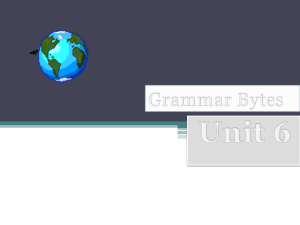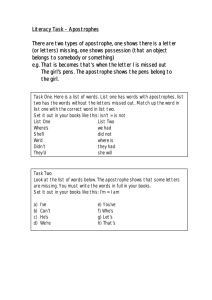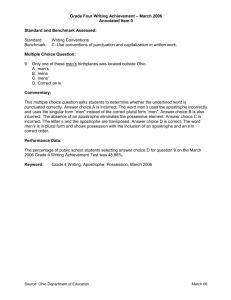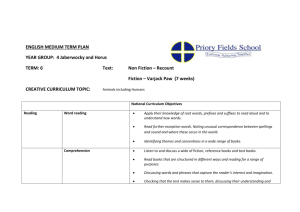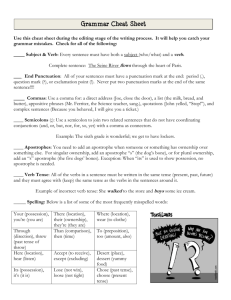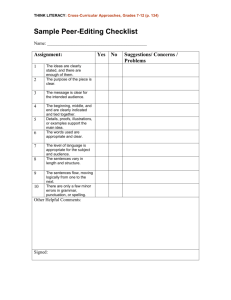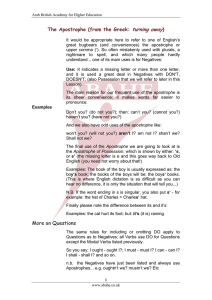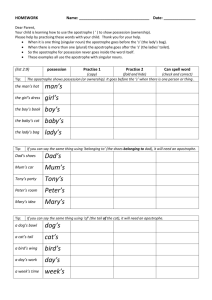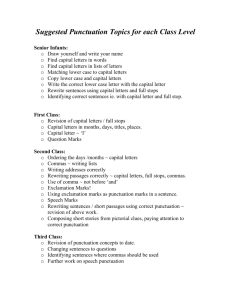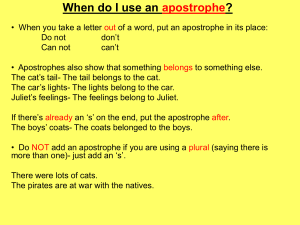Please Click Here to the Powerpoint
advertisement
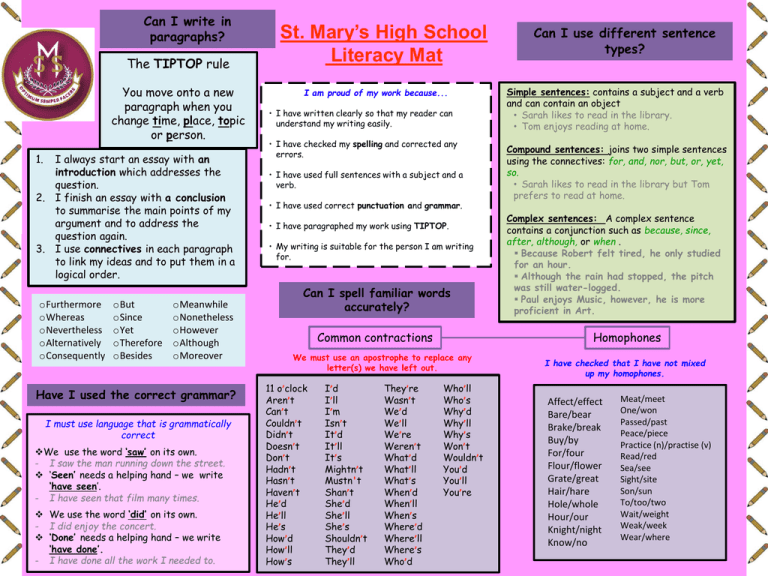
Can I write in paragraphs? The TIPTOP rule You move onto a new paragraph when you change time, place, topic or person. 1. I always start an essay with an introduction which addresses the question. 2. I finish an essay with a conclusion to summarise the main points of my argument and to address the question again. 3. I use connectives in each paragraph to link my ideas and to put them in a logical order. oFurthermore oWhereas oNevertheless oAlternatively oConsequently oBut oSince oYet oTherefore oBesides oMeanwhile oNonetheless oHowever oAlthough oMoreover Have I used the correct grammar? I must use language that is grammatically correct We use the word ‘saw’ on its own. - I saw the man running down the street. ‘Seen’ needs a helping hand – we write ‘have seen’. - I have seen that film many times. We use the word ‘did’ on its own. - I did enjoy the concert. ‘Done’ needs a helping hand – we write ‘have done’. - I have done all the work I needed to. St. Mary’s High School Literacy Mat I am proud of my work because... • I have written clearly so that my reader can understand my writing easily. • I have checked my spelling and corrected any errors. • I have used full sentences with a subject and a verb. • I have used correct punctuation and grammar. • I have paragraphed my work using TIPTOP. • My writing is suitable for the person I am writing for. Can I spell familiar words accurately? Common contractions I’d I’ll I’m Isn’t It’d It’ll It’s Mightn’t Mustn't Shan’t She’d She’ll She’s Shouldn’t They’d They’ll They’re Wasn’t We’d We’ll We’re Weren’t What’d What’ll What’s When’d When’ll When’s Where’d Where’ll Where’s Who’d Simple sentences: contains a subject and a verb and can contain an object • Sarah likes to read in the library. • Tom enjoys reading at home. Compound sentences: joins two simple sentences using the connectives: for, and, nor, but, or, yet, so. • Sarah likes to read in the library but Tom prefers to read at home. Complex sentences: A complex sentence contains a conjunction such as because, since, after, although, or when . Because Robert felt tired, he only studied for an hour. Although the rain had stopped, the pitch was still water-logged. Paul enjoys Music, however, he is more proficient in Art. Homophones We must use an apostrophe to replace any letter(s) we have left out. 11 o’clock Aren’t Can’t Couldn’t Didn’t Doesn’t Don’t Hadn’t Hasn’t Haven’t He’d He’ll He’s How’d How’ll How’s Can I use different sentence types? Who’ll Who’s Why’d Why’ll Why’s Won’t Wouldn’t You’d You’ll You’re I have checked that I have not mixed up my homophones. Affect/effect Bare/bear Brake/break Buy/by For/four Flour/flower Grate/great Hair/hare Hole/whole Hour/our Knight/night Know/no Meat/meet One/won Passed/past Peace/piece Practice (n)/practise (v) Read/red Sea/see Sight/site Son/sun To/too/two Wait/weight Weak/week Wear/where Is my punctuation accurate? St. Mary’s High School Literacy Mat Basics: Every sentence must start with a capital letter. Every sentence must finish with some form of punctuation: .?! Proper nouns need capital letters. These are unique people, places or things e.g. there are many cities so ‘city’ doesn’t take a capital letter. However there is only one London, therefore it takes a capital letter. When writing titles of works such as books, films or plays: Capitalise the first word Capitalise any main/important words Don’t capitalise minor words such as ‘and’, ‘of’ or ‘the’ e.g. The Sound of Music, The Wizard of Oz, Harry Potter and the Goblet of Fire When writing speech: Go to a new line when a different person speaks e.g. “Good morning” said the Headteacher. “It’s the afternoon!” replied the student. Each person’s speech is marked with speech marks e.g. “Walk on the left” said Mr Mathews. Can I spell accurately? Sound out the word Think about how it looks Think about a similar word Is there a memory sentence for this word? (e.g. big elephants cannot always use small exits) Find the word in a list – o Key words list o Frequently used words list o Your own word bank Look it up in a dictionary/spellchecker Ask a friend or teacher To learn it: look, cover, write , check Once you’ve solved it, add the correct spelling to your own word bank. Can I use punctuation? The Apostrophe I always aim to use apostrophes correctly. There are two main reasons why we use apostrophes: for possession and to replace a letter or letters Note: Apostrophes are NEVER used to denote plurals Full stop . Comma , Question mark Exclamation mark ? Apostrophe ‘ ! Speech marks “” Colon : Semicolon ; Dash / hyphen - Brackets ( ) Ellipsis … indicates that a sentence has finished indicates a slight pause in a sentence, separates clauses in a complex sentence and items in a list goes at the end of a question goes at the end of a dramatic sentence to show surprise or shock shows that letter(s) have been left out or indicates possession indicate direct speech, the exact words spoken or being quoted introduces a list, a statement or a quote in a sentence separates two sentences that are related and of equal importance separates extra information from the main clause by holding words apart can be used like dashes, they separate off extra information from the main clause to show a passage of time, to hook the reader in and create suspense Apostrophe for Possession (To show that something belongs to another) If a single thing/person owns anything, add an apostrophe + ‘s’. •The dog’s bone •The boy’s homework •Jones’s bakery •Yesterday’s lesson However, if it is plural (more than one), an apostrophe comes after the ‘s’. •The dogs’ bones •The boys’ homework •Joneses’ bakeries (lots of Jones families) •Many websites’ content is educational There/ their/ they’re Note: special care must be taken over the use of there, their and they’re as they sound the same but are used quite differently: There shows position Your seat is over there Their shows that ‘they’ own something Their blazers are navy blue They’re is short for they are as in They’re revising every day ITS Note: its, which shows that something owns something (like our, his etc), does not take an apostrophe: the dog ate its bone and we ate our dinner Your/ you’re Note: special care must be taken over the use of your and you’re as they sound the same but are used quite differently: Your is possessive as in this is your pen You’re is short for you are as in you’re coming over to my house
